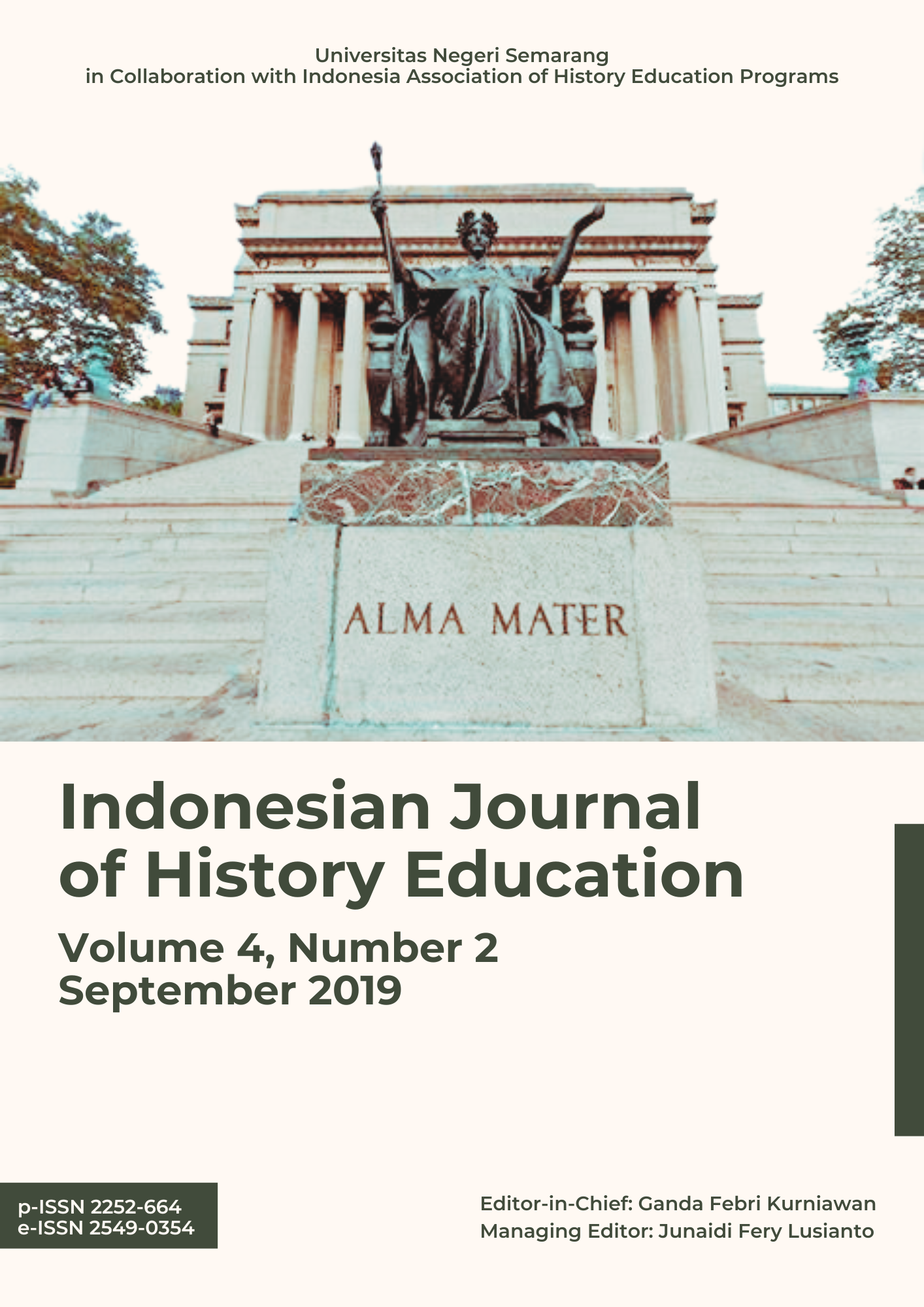Influence Using the Project-Based Learning Model in History Learning on Learning Outcomes Student Class XI IPS MAN Temanggung
Abstract
This research discusses the influence of using a learning model learning project based on the teaching history of the study graders' results in Xi IPS Man Temanggung. The approach that was undertaken in the research is the quantitative approach, a quasi-experimental design. The population in the study was a student xi ips man Temanggung academic year 2015/2016; the sample in the research was a class XI social 1; this procedure used the sample collection using a random sample technique. The variable in this research is a project-based learning model and study results. Data collection method in a test, survey, and documentation. Search shows that study results showed students who use the project-based learning model have an average point pretest of 61.86 and a posttest increase of 82.94. Is the use of a learning model project-based learning of the results of the studied history. The size of the influence of the use of the learning model project-based learning is 23.8, showing that the use of the learning model project-based learning is the dominant factor in determining whether there is an increase or a failure in the study results.
References
Aman. (2011). Model Evaluasi Pembelajaran Sejarah. Penerbit Ombak.
Arikunto, S. (2002). Prosedur Penelitian Suatu Pendekatan Praktik. Rineka Cipta.
Astuti, E. I. F. (2018). Strategi guru dalam meningkatkan efektifitas proses pembelajaran pada mata pelajaran sejarah kelas X IPS di MAN 1 Malang. J-PIPS (Jurnal Pendidikan Ilmu Pengetahuan Sosial), 5(1), 64-77.
Fajri, N., Yoesoef, A., & Nur, M. (2016). Pengaruh model pembelajaran kooperatif tipe talking stick dengan strategi joyful learning terhadap prestasi belajar siswa pada mata pelajaran IPS kelas VII MTsN Meuraxa Banda Aceh. JIM: Jurnal Ilmiah Mahasiswa Pendidikan Sejarah, 1(1).
Firdianti, A. (2018). Implementasi manajemen berbasis sekolah dalam meningkatkan prestasi belajar siswa. Gre Publishing.
Ilyas, M., & Syahid, A. (2018). Pentingnya metodologi pembelajaran bagi guru. Al-Aulia: Jurnal Pendidikan dan Ilmu-Ilmu Keislaman, 4(1), 58-85.
Kochhar, S. K. (2008). Teaching of History Edisi Pertama. PT Grasindo.
Madjid, M. D., & Wahyudhi, J. (2014). Ilmu sejarah: Sebuah pengantar. Kencana.
Maharani, T. (2012). Implementasi Model Pembelajaran Bermain Peran (Role Play) dalam Upaya Meningkatkan Motivasi dan Prestasi Belajar Siswa pada Mata Pelajaran Mengelola Pertemuan/Rapat Kelas X Administrasi Perkantoran 2 Di SMK Negeri 1 Banyudono Tahun Pelajaran 2011/2012.
Mariyaningsih, N., & Hidayati, M. (2018). Bukan Kelas Biasa: Teori dan Praktik Berbagai Model dan Metode Pembelajaran menerapkan inovasi pembelajaran di kelas-kelas inspiratif. CV Kekata Group.
Nahar, N. I. (2016). Penerapan teori belajar behavioristik dalam proses pembelajaran. NUSANTARA: jurnal ilmu pengetahuan sosial, 1(1).
Pramono, S. E. (2012). Perbaikan kesalahan konsep pembelajaran sejarah melalui metode pemecahan masalah dan diskusi. Paramita: Historical Studies Journal, 22(2).
Purnomo, A. (2011). Evaluasi Pembelajaran Sejarah. UNNES.
Sanjaya, W. (2006). Strategi Pembelajaran Berorientasi Standar Proses Pendidikan. Prenada Media.
Sauri, S. (2010). Membangun karakter bangsa melalui pembinaan profesionalisme guru berbasis pendidikan nilai. Jurnal Pendidikan Karakter, 2(2), 1-15.
Setiadi, E. M. (2017). Ilmu sosial & budaya dasar. Kencana.
Setiawan, S. A., & Woyanti, N. (2010). Pengaruh umur, pendidikan, pendapatan, pengalaman kerja dan jenis kelamin terhadap lama mencari kerja bagi tenaga kerja terdidik di kota Magelang (Doctoral dissertation, Universitas Diponegoro).
Sole, F. B., & Anggraeni, D. M. (2017). Respon guru terhadap instrumen penilaian sikap ilmiah sains siswa sekolah dasar. Jurnal Edukasi Sumba (JES), 1(1).
Sugiyono. (2009). Metode Penelitian Kuantitatif, Kualitatif, dan R & D. Alfabeta.
Susilo, A., & Sarkowi, S. (2018). Peran guru sejarah abad 21 dalam menghadapi tantangan arus globalisasi. Historia: Jurnal Pendidik Dan Peneliti Sejarah, 2(1), 43-50.
Uno, H. (2011). Belajar dengan Pendekatan PAIKEM. Bumi Aksara.
Widianingsih, H. (2009). Keefektifan Pembelajaran Berbasis Proyek Berbantuan LKS dalam Pencapaian Hasil Belajar Materi Pokok Segiempat Pada Peserta Didik dalam Kelas VII SMP N 2 Warung asem Kabupaten Batang. Skripsi. FMIPA Universitas Negeri Semarang: Semarang.
Widiansyah, A. (2017). Peran ekonomi dalam pendidikan dan pendidikan dalam pembangunan ekonomi. Cakrawala-Jurnal Humaniora, 17(2), 207-215.
Copyright (c) 2019 Indonesian Journal of History Education

This work is licensed under a Creative Commons Attribution 4.0 International License.
Copyright Notice
An author who publishes in the Jurnal Indonesian Journal of History Education agrees to the following terms:
- Author retains the copyright and grants the journal the right of first publication of the work simultaneously licensed under the Creative Commons Attribution-ShareAlike 4.0 License that allows others to share the work with an acknowledgement of the work's authorship and initial publication in this journal
- Author is able to enter into separate, additional contractual arrangements for the non-exclusive distribution of the journal's published version of the work (e.g., post it to an institutional repository or publish it in a book) with the acknowledgement of its initial publication in this journal.
- Author is permitted and encouraged to post his/her work online (e.g., in institutional repositories or on their website) prior to and during the submission process, as it can lead to productive exchanges, as well as earlier and greater citation of the published work (See The Effect of Open Access).
Read more about the Creative Commons Attribution-ShareAlike 4.0 Licence here: https://creativecommons.org/licenses/by-sa/4.0/.




